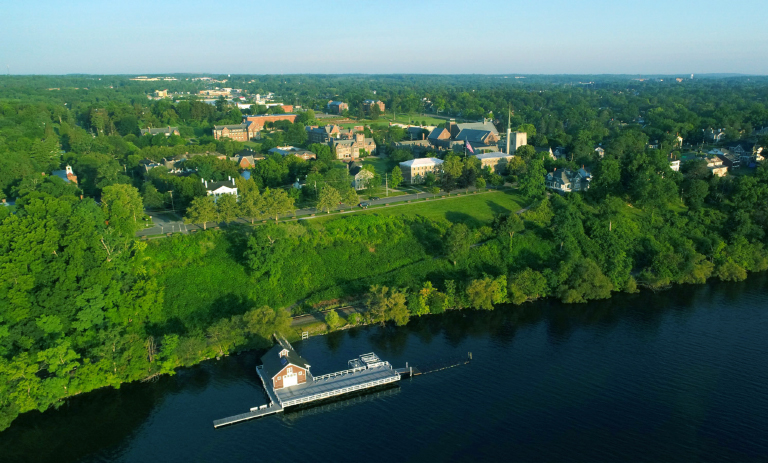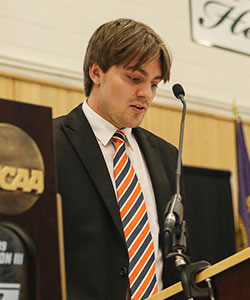
Recent Grads
Jonas Toupal '19

I came to the United States because there was no way of combining top-level academics and athletics in my home country of Czech Republic. I did not want to compromise either of these spheres, which is why I decided to join HWS. Academically, I knew it was the place that would get me to the next level; athletically, Hobart hockey is a solidified powerhouse.
I was always drawn to geology, as it is one of the few disciplines that allows one to work outside in the environment. A great way to complement the geoscience program was through the creation of my independent major, planetary science, which allowed me to take classes such as “Geographic Information Systems,” “Economics of Natural Resources” or “Observational Astronomy,” all very important classes that shaped my two summers of research experience at HWS. After my sophomore year, I worked with Associate Professor of Physics Leslie Hebb to use spectral emission of auroras of exoplanets to find atmospheric oxygen on those planets. After my junior year, I worked with Professor of Geoscience Nan Crystal Arens and Associate Professor of Environmental Studies Kristen Brubaker to investigate the potential of using satellite images to map mercury contamination as a result of gold mining.
At HWS, I tried to stay busy. Aside from winning three championships and earning a spot in the NCAA Division III Frozen Four with the Hobart hockey team, one of the greatest memories from my four years at HWS, I also helped to start and co-lead the HWS Engineering Club, worked as a Study Mentor and was a member of the Druid Society. While all of these extracurriculars definitely helped to make my case when applying to graduate schools, it was mostly my research experience and working very closely with Nan that led me to getting accepted into the Ph.D program at University of Pennsylvania. Her guidance, mentorship and feedback on the countless versions of my statement of purpose made my application as strong as it could have been. Along with a strong statement of purpose, the two summers of independent research experience and an early version of a manuscript on our remote sensing research made me stand out. Every institution I applied to wanted to see a strong set of research skills, which is why I am so grateful for all the undergraduate research opportunities available at HWS.
My first year of the program at Penn mostly involved taking classes, applying for grants, and a lot of literature research. In June 2020, I presented at the international geochemical Goldschmidt Conference which was virtual. I was selected as a student volunteer for the conference, and seeing such a large conference transition into the virtual space in a matter of months was a great logistical learning experience.
While summer (and the whole year for that matter) of 2020 was less than ideal, I was still able to collect samples to continue my research. I collected ~50 water and sediment samples from four lithium deposits spanning across three countries in Central Europe as well as several rock samples from each deposit. The majority of my fall revolved around analyzing the water samples, using Inductively-Coupled Plasma Optical Emission Spectroscopy and Ion Chromatography. Then, I used the process of thermodynamic modeling of the dissolution of the minerals present in these environments to explain the water chemistry that we see. The goal of the project is to establish background concentrations of lithium and other elements in waters near these deposits to a) highlight a potential public health concern, b) set a benchmark for mining companies to remediate the areas to after mining is halted, and c) to increase the knowledge about these deposits so more can be found elsewhere.
Back home in the Czech Republic, I selected several lithium deposits that I sampled this summer. So while Covid-19 certainly disturbed a lot of the plans I (and just about everyone else) had, I was able to get the most of my time and keep pushing my project forward.
Traditionally, lithium is mined from brines in semi-arid parts of the world, but the recent increase in demand is causing the exploration of granite deposits as well. I would like to understand the potential negative impacts that mining of these deposits might introduce and suggest ways to prevent them.
I am also lucky enough to continue my passion for hockey at Penn, even though just on the club level.
